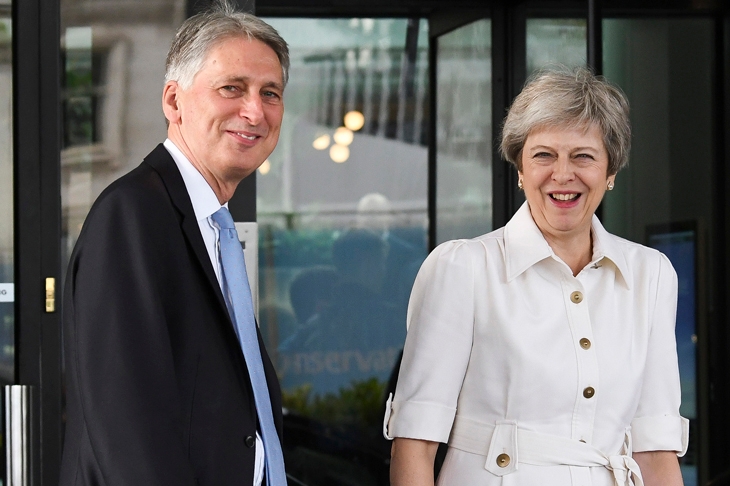‘Let me say it, loud and clear: the Conservative party is, and always will be, the party of business,’ declared Philip Hammond at Birmingham — a few hours after City tycoon and former Tory treasurer Michael Spencer told the BBC that the Prime Minister had ‘let herself down personally by not being a champion of business’. Were Spencer’s doubts assuaged by the Chancellor’s reassurance? I doubt it: the truth is Spencer was right.
Theresa May signalled her non–championship of business in her 2016 leadership bid when, ahead of John McDonnell, she spoke of forcing companies to accept worker representatives on boards and of the ‘irrational, unhealthy’ pay gap between top executives and average workers. Her people scrapped enterprise schemes sponsored by David Cameron in the Cabinet Office, while the Northern Powerhouse, George Osborne’s catalyst for commerce in Manchester and Leeds, went into the deep freeze. The Prime Minister appears to have no friends in the business world and no time for its concerns.
Well, Mrs May is not, in any sense, the heir to Margaret Thatcher — who was sometimes accused of listening too much to friends in the business world — and nor does she have cabinet material, as Thatcher did, of the entrepreneurial calibre of Michael Heseltine, Peter Walker and David Young. All she has in the way of business experience around her are a clutch of second–raters from the City, Spreadsheet Phil who had an obscure career in ‘consultancy’, Gavin Williamson who used to sell fire-places, and Jeremy Hunt, who once launched an educational venture called Hotcourses.
And of course even when politicians do give business people a hearing, the loudest are likely to be those like Spencer who have poured money into party coffers — rather than those such as Ralf Speth of Jaguar Land Rover, Emma Walmsley who runs the pharma giant GlaxoSmithKline, and Sir Charlie Mayfield of the John Lewis Partnership, to name but three, who could tell the PM what’s really about to happen. Being ‘the party of business’ isn’t a vote-winning slogan, but being the party that takes heed of the worries and forecasts of the businesses that drive chunks of the economy is surely a prerequisite of Conservatives in power. Mrs May should invite a dozen to Downing Street next week, and do nothing but listen.
Foot on the throttle
This week’s motoring news is more upbeat. Aston Martin, the Warwickshire-based marque favoured by James Bond and the Prince of Wales, came to the stock market with an expected valuation (even after a last-minute downward tweak) of £4 billion, placing it on higher multiples to earnings than its chief European rival Ferrari.
With talk of repositioning Aston Martin as a luxury goods brand rather than a mere maker of fast cars, of doubling production within five years, and of being ‘well insulated’ against a bad Brexit, this has been a case-study in IPO positioning, otherwise known as City spin. It will reward earlier investors such as the Italian tycoon Andrea Bonomi, who bought a 37 per cent stake in 2012, with a tenfold return on their money, and promises a £20 million payout for chief executive Andy Palmer (formerly of Nissan) if he delivers. Has he overdone the hype? Probably, but in these gloomy times for the wider car industry, it’s good to find someone with his foot on the throttle.
Headwinds
Another obvious bellwether of Brexit’s impact is the airline industry. The government’s no-deal scenario planning includes the worst-case possibility that ‘UK and EU licensed airlines would lose the automatic right to operate air services between the UK and the EU without seeking advance permission’ — and while no one really expects pragmatic aviation bureaucrats to allow that to happen, whatever mess politicians present them with, Transport Secretary Chris Grayling hardly put minds at rest when he told the Tory party conference his department would be ready to respond with emergency help as it did to last year’s collapse of Monarch Airlines.
The real problem — as with auto makers’ challenges over falling diesel car sales and new emissions tests — is that other adverse factors are likely to impinge on airlines just as Brexit uncertainty reaches its peak. Ryanair this week issued a profits warning, blaming strikes by pilots and cabin crew, rising fuel costs and a fall in customer confidence affecting autumn bookings. Analysts are also wary of the impact of higher fuel costs on IAG (the combination of British Airways and Iberia) and of a coming overall increase in short-haul capacity across Europe at a time when passenger demand looks set to fall. You may never have heard of Primera Air, a Danish-owned low-cost airline that failed this week, leaving passengers stranded in Spain and the US, but it could be a harbinger of cyclical hard times for the industry ahead.
Out-of-control ego
Also making headlines again was Elon Musk, the wacky entrepreneur behind the Tesla electric car venture in California whose shares — chased upwards by tech investors without apparent regard to the company’s underlying performance — have lately dipped to $265 from an August high above $380. Musk angered the Securities and Exchange Commission in the summer by spuriously claiming he was about to launch a buyout of the company at well above its then market value. His board did nothing to censure him, but after a brief fight with the SEC he has agreed to stand down as chairman for three years, while remaining chief executive. Musk and Tesla both face $20 million fines for the episode — and both arguably attract far more media attention than is merited by their futuristic car project. This is really an old-fashioned story of weak governance in a public company with an out-of-control ego on top.







Comments